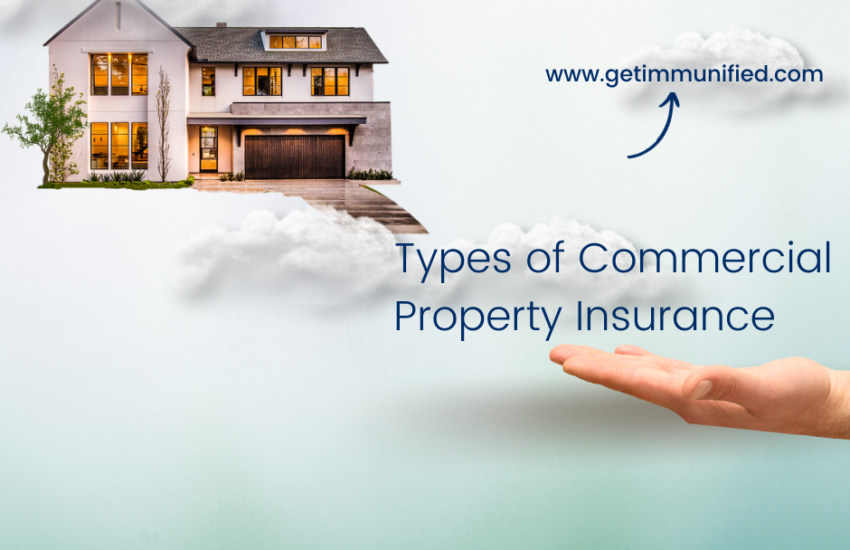If you own or operate a business and seek to purchase commercial property insurance, then it’s in your best interest to understand the different types of commercial property insurance that are available so you can make better-informed decisions when making a purchase.
By doing this, you can protect your business from financial losses and also make better commercial insurance decisions.
In this article, we’ll explore the various types of commercial property insurance, the benefits of commercial property insurance, and other essential information you may need concerning this policy.
Before we dive right in, let’s first of all get to fully understand what commercial property insurance is.

What is Commercial Property Insurance?
Commercial property insurance is a type of insurance that covers the physical property and equipment of your business.
We can also say that this insurance protects your business from financial losses that result from certain activities like fire, peril, etc.
Unlike homeowners insurance, which covers your residential properties, this insurance is designed to protect your properties.
Benefits of Commercial Property Insurance
The following are the benefits of commercial property insurance:
- Financial protection
- Peace of mind
- Compliance with regulations
- Protection from natural disasters
- It protects your business from vandalism.
1. Financial Protection
This policy will cover the cost of repairing or replacing your lost or damaged items. Let’s say any of your covered property gets damaged due to some reason, then this insurance will take care of the financial aspects of repairing or replacing it.
2. Peace of Mind
Peace of mind is another major benefit of having commercial property insurance. Knowing that you’re protected against financial losses can help you focus on running your business without worrying about what’s going to happen next.
3. Compliance With Regulations
Having the right policy in place can help you meet these requirements and avoid any potential legal or financial penalties.
It can also give you peace of mind, knowing that you’re operating within the bounds of the law.
4. Protection From Natural Disasters
This is another major benefit of commercial property insurance. Depending on the policy you have, this insurance can cover damages from a variety of events, such as hurricanes, tornadoes, floods, earthquakes, etc.
This insurance can be important for businesses in areas that are prone to natural disasters, and it may cover the cost of repairing or replacing damaged property as well as any additional costs that come with the event.
5. Protection From Vandalism
Vandalism is another type of event that commercial property insurance covers. If your property is vandalized, the policy may cover the cost of repairing or replacing it.
The policy may also cover the cost of cleaning up graffiti or other forms of vandalism and enable you to get your business back on track as soon as possible.
15 Types of Commercial Property Insurance
The following are the types of commercial property insurance:
- Cyber Insurance
- Cargo Insurance
- Plant Machinery Insurance
- Office Package Policy
- Directors and Officers Liability Insurance
- Standard commercial property insurance
- Business interruption insurance
- Flood Insurance
- Earthquake insurance
- Burglary insurance
- Fire insurance
- Liability insurance
- Windstorm insurance
- Sinkhole insurance
- Goods in transit insurance.
Overview of the Types of Commercial Property Insurance
1. Cyber Insurance
In today’s world, cyber insurance has become very important for businesses to thrive effectively.
To curtail the risks, such as data breaches, hacking, cyber-attacks, etc., that come with the digital world, you should purchase cyber insurance.
This insurance helps firms recover from money losses and damages due to digital mishaps.
2. Cargo Insurance
Cargo insurance is vital for businesses transporting goods by land, air, or sea. It safeguards your goods against the losses or ruins of cargo that is in transit.
Some of these risks could be from theft, mishaps, natural disasters, etc., and you will be protected against them as long as you have this insurance coverage.
3. Plant Machinery Insurance
Plant machinery insurance covers machinery and equipment in manufacturing plants and factories. This insurance protects your business against damage, breakdowns, lawsuits, etc that might occur during the operation of machinery.
4. Office Package Policy
An office package policy is broad insurance for office businesses. It mixes several coverages into one policy.
These include property, liability, and business interruption insurance. It also protects office buildings, equipment, furnishings, and other assets.
5. Directors and Officers Liability Insurance
Directors and officers liability insurance (D&O) covers the directors and officers of a company. It protects their assets if they are blamed for wrongful acts, mistakes, or omissions in their roles.
6. Standard Commercial Property Insurance
This is also known as all-risk insurance. It is one of the most common types of insurance coverage. Generally, it covers damage to your building, equipment, and inventory from incidents like fire, theft, vandalism, windstorms, etc.
Some events are not covered by this insurance policy and they include earthquakes, floods, etc. This is because these events require separate policies due to their nature.
7. Business Interruption Insurance
Business interruption insurance is designed to help your business stay afloat in case it is forced to close temporarily due to a covered event, such as a fire or storm.
It covers lost income and ongoing expenses, such as rent and utilities, during the closure. This type of insurance can be crucial, especially if your business relies on regular income to stay afloat.
It’s often included in a standard commercial property insurance policy, but it may also be purchased separately.
8. Flood Insurance
Floods are one of the most common natural disasters in the world, so this type of insurance can be very important for businesses in areas that are prone to flooding.
Flood insurance can cover damage to your building and contents, as well as the costs of cleaning up and repairing such damage.
9. Earthquake Insurance
This insurance covers damages or losses due to earthquakes. Most times, standard commercial property insurance does not cover these damages, so that’s where earthquake insurance comes in.
Earthquakes can cause extensive damage to buildings, contents, and infrastructure, so this type of insurance can be very important for businesses in areas that are prone to earthquakes.
These policies typically have a high deductible, so it’s important to understand what your policy covers and what your out-of-pocket costs would be in the event of an earthquake.
10. Burglary Insurance
This type of insurance is particularly important for businesses that store valuable items on their premises. It includes retail stores, banks, etc.
Burglary insurance policies typically cover damage to your property and inventory, as well as loss of money or securities.
11. Fire Insurance
Fire insurance is a type of insurance that covers damages that fire and other perils cause. It typically covers damage to buildings, contents, inventory, etc.
Fire insurance is usually included in a standard commercial property insurance policy, but it may be purchased separately in some cases.
You need to know that this insurance does not cover all kinds of fire incidents, so you have to understand what types of fire incidents your policy covers to avoid some forms of confusion or loggerheads with your insurance provider.
12. Liability Insurance
Most businesses carry out some form of liability insurance, such as general liability insurance or professional liability insurance.
It’s important to understand the coverage limits and exclusions of your policy, as well as any other things that will be necessary for you to know.
13. Windstorm Insurance
It’s important for businesses in areas that are prone to windstorms, such as coastal areas, to have this insurance.
Windstorm insurance typically covers damage to buildings, contents, and inventory, but it may have exclusions for certain types of damage, such as flooding or water damage from a storm surge.
14. Sinkhole Insurance
This is a type of insurance that covers damages that occur when the ground beneath the surface collapses.
Sinkhole insurance is important for businesses in areas that are prone to sinkholes, and it can help cover the repair or replacement costs for the building and its contents, as well as the cost of stabilizing the sinkhole.
15. Goods in Transit Insurance
Goods-in-transit insurance is a type of insurance that covers goods while they’re being transported. This can include goods that you ship by land, sea, or air.
Goods in transit insurance can cover loss or damage due to a variety of causes, such as theft, fire, and other incidents.
Some policies may also cover costs related to customs delays or quarantines. Businesses that ship goods should consider goods in transit insurance to protect their assets while they’re being transported.
FAQs on the Types of Commercial Property Insurance
What's the difference between commercial property insurance and homeowners insurance?
Commercial property insurance covers businesses, while homeowners insurance covers residences.
Is commercial property insurance required by law?
Commercial property insurance is not required by law, but it's highly recommended for businesses.
What does a typical commercial property insurance policy cover?
A typical commercial property insurance policy covers damage to the building and contents, loss of income, extra expenses, and liability.
What is the difference between replacement cost and actual cash value coverage?
Replacement cost coverage pays for the full replacement value of a property, while actual cash value coverage pays only the depreciated value.
What is an exclusion in a commercial property insurance policy?
An exclusion is a provision in an insurance policy that specifies a type of loss that is not covered.
We Also Recommend:
- Best Health Insurance Companies For Your Family
- How Much Does Commercial Truck Insurance Cost?
- 10 Cheapest Commercial Property Insurance
- How Much Does Commercial Insurance Cost?
- 10 Cheapest Vendor Insurance.
Conclusion
Commercial property insurance is an important form of coverage for businesses because it protects them from a variety of risks, such as fire, theft, natural disasters, etc.
There are various types of policies available, and the right policy for your business will depend on its unique needs and risks.
You have to work with an insurance agent to find the right policy and coverage limits that are best for your business.
Also, it’s important to review the policy regularly and update it as your business grows and changes.
